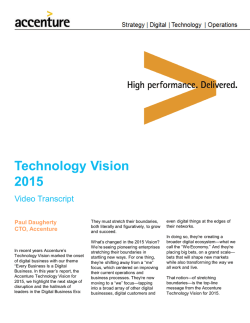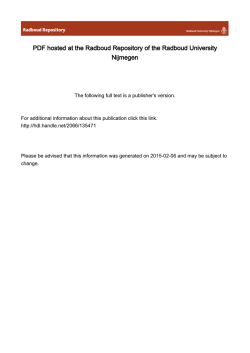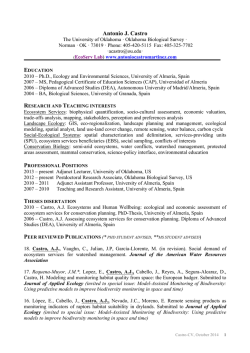
Digital Business Era: Stretch Your Boundaries
Accenture Technology Vision 2015 Digital Business Era: Stretch Your Boundaries EXECUTIVE SUMMARY # t e c h v i s i o n 2 01 5 INTRODUCTION If your company is like most, the last few years have seen your top teams focused on leveraging social, mobile, analytics, and cloud (SMAC) to transform your enterprise into a digital business. Today, the challenge has become: What will business leaders do with their digital advantage? It’s not a trivial question. Becoming a digital business is a massive transformation. Two years ago, the Accenture Technology Vision forecasted the pervasive need for every business to become a digital business. We saw technology begin to take its place as a primary driver of profitability and market differentiation in every industry. 2 Last year at Accenture, we began to see the industry leaders embrace this transformation and begin to reimagine their businesses for the digital era. The Accenture Technology Vision 2014 declared that “Big is the Next Big Thing.” We saw that the next logical step for large and often long-established companies was to start using technology not just as a way to improve their own internal processes, but also as a driving force for how they grow. We predicted that these new “digerati,” with their deep resources, huge scale, and process discipline, were about to rewrite much of the digital playbook. A C C E N T U R E T E C H N O L O G Y V I S I O N 2 01 5 Today, we see pioneering enterprises beginning to do just that—but they are doing far more than just flexing their digital muscles. They are fundamentally changing the way they look at themselves—leading enterprises are quickly mastering the shift from “me” to “we.” They are stretching their boundaries by tapping into a broad array of other digital businesses, digital customers, and even digital things at the edge of their networks. Leaders who are eager to drive change are using this broader digital ecosystem to place bets on a grand scale. These forwardthinking companies are looking to shape entire markets and change the way we work and live. Succeeding in the “We Economy” The digital era not only makes big bets possible but increasingly necessary. The Internet of Things (IoT) is becoming a force that is driving new innovation and new opportunities by bringing every object, consumer, and activity into the digital realm. At the same time, leading businesses are making similar changes within their enterprises by digitizing every employee, process, product, and service. Taken in aggregate, enterprises find themselves connected to a digital fabric that has the potential to touch all aspects of their business, their customer relationships, and the world around them. Already, this fabric has provided enterprises with an ability to connect and scale up in unprecedented ways. Companies routinely deal with hundreds of business processes, thousands of employees, and millions of consumers. Many large companies are at a scale where they touch billions of lives. More and more, however, companies are beginning to see that these connections are not limited just to their employees and customers. They also have the potential to tie themselves into a global network of businesses, individuals, and things from every industry around the world. This grand network of connections and its transformational power introduce a new era in the digital age—the age of “digital ecosystems.” Pioneering companies have already realized the implications of tapping into a digital ecosystem. They see that in such digitally driven, hyperconnected times, they have the capacity for action beyond transforming themselves into digital businesses. Huge efficiencies can and will be gained as businesses continue to master digital technologies internally. 3 # t e c h v i s i o n 2 01 5 Visionary companies, however, are recognizing that as every business becomes a digital business, together they can effect change on a much bigger stage. By collaborating, they can shape experiences— and outcomes—in ways never before possible. This is highlighted best in the rapidly growing Industrial IoT. Here, companies are using these connections to offer new services, reshape experiences, and enter new markets by creating digital ecosystems. Home Depot, for example, is looking to shape the way people live through an emerging connected home market. The company is working with manufacturers to make sure that all of the connected home products it sells are compatible with the Wink connected home system. In doing so, Home Depot is creating its own connected home ecosystem, with a wide range of services that are easy to install. Philips is taking a similar approach. No longer is their healthcare practice just a producer of medical equipment; Philips is teaming up with Salesforce to build a platform that they believe will reshape and optimize the way healthcare is delivered. The envisioned platform will create an ecosystem of developers building healthcare applications to enable collaboration and workflow between doctors and patients across the entire spectrum of care, from self-care and prevention to diagnosis and treatment through recovery and wellness. By integrating data from multiple sources worldwide, Philips sees an enormous opportunity to improve patient health by enhancing the decision-making capability of medical professionals while increasing the active engagement of patients in their own treatment. The ecosystem Philips orchestrates to achieve these improved outcomes is vast: electronic medical records, diagnostic and treatment information obtained through Philips’ imaging equipment, monitoring equipment, and personal devices and technologies like Apple’s HealthKit. 4 Fiat is looking toward connected cars as the next growth opportunity within the automotive industry. Partnering with companies like TomTom, Reuters, Facebook, and TuneIn, Fiat is creating its own Uconnect platform. It will be integrated with the Fiat-Chrysler Group’s vehicles to provide drivers with communication, entertainment, and navigation features that can help drivers stay focused on driving. Home Depot, Philips, Fiat, and many other companies are making big bets on huge opportunities that have the potential to bring about change on a global scale. By tapping into digital ecosystems, these companies have the ability to realize ambitions that transcend any single business or any one industry. These pioneering businesses see great potential to make a difference—and to make a profit—by operating as ecosystems, not just as individual corporate entities. By mastering the shift from “me” to “we,” these leading enterprises are shaping a new economy—the “We Economy.” Ordinary businesses can now tackle challenges that were previously well beyond their scope: an opportunity to help design and create smart mega-cities of the future…a chance to radically rebuild centuries-old modes of transportation… a solution to raise the quality of healthcare by tackling it holistically, across many industries from hospitals to insurance and apparel. These are the types of “epic” opportunities that excite customers, inspire employees, galvanize longterm suppliers—and present the opportunity of big rewards to investors. The new power brokers will be the master orchestrators that place themselves at the center of these digital ecosystems. These leaders will quickly master new digital relationships with their customers, end users, suppliers, alliance partners, developers, data sources, makers of smart devices, and sources of specialty talent. All will share the same goals: to grow new markets and to grow their individual businesses. A C C E N T U R E T E C H N O L O G Y V I S I O N 2 01 5 None of this will be easy, but the effort has the potential for tremendous rewards. The new age of the digital ecosystem isn’t only about changing an individual company; it’s about shaping entire markets. Each enterprise will determine its own fortunes—and that’s an opportunity that no company will want to miss. 2015 Vision Trends: Hallmarks of tomorrow’s digital business leaders Technology is moving at a breakneck pace. Social, mobile, analytics, cloud, and increasingly the IoT have become driving forces behind the rapid evolution of digital businesses. This year’s Accenture Technology Vision highlights five emerging themes that reflect the shifts being seen among the digital power brokers of tomorrow. The Internet of Me: Our world, personalized. As everyday objects are going online, so too are experiences—creating an abundance of digital channels that reach deep into every aspect of individuals’ lives. Forward-thinking businesses are changing the ways they build new applications, products, and services. To gain control over these points of access, they are creating highly personalized experiences that engage and exhilarate consumers—without breaching the customer’s trust. The companies that succeed in this new “Internet of Me” will become the next generation of household names. Outcome Economy: Hardware producing hard results. Intelligent hardware is bridging the last mile between the digital enterprise and the physical world. As leading enterprises come face-to-face with the IoT, they are uncovering opportunities to embed hardware and sensors in their digital toolboxes. They are using these highly connected hardware components to give customers what they really want: not more products or services, but more meaningful outcomes. These “digital disrupters” know that getting ahead is no longer about selling things—it’s about selling results. Welcome to the “outcome economy”. The Platform (R)evolution: Defining ecosystems, redefining industries. Among the Global 2000, digital industry platforms and ecosystems are fueling the next wave of breakthrough innovation and disruptive growth. Increasingly, platform-based companies are capturing more of the digital economy’s opportunities for strong growth and profitability. Rapid advances in cloud and mobility not only are eliminating the technology and cost barriers associated with such platforms, but also are opening up this new playing field to enterprises across industries and geographies. In short: Platformbased ecosystems are the new plane of competition. Intelligent Enterprise: Huge data, smarter systems— better business. The next level of operational excellence and the next generation of software services will both emerge from the latest gains in software intelligence. Until now, increasingly capable software has been geared to help employees make better and faster decisions. But with an influx of big data—and advances in processing power, data science, and cognitive technology— software intelligence is helping machines to make even more, better informed decisions. 5 # t e c h v i s i o n 2 01 5 Business and technology leaders must now view software intelligence not as a pilot or a one-off project, but as an across-the-board functionality— one that will drive new levels of evolution and discovery, propelling innovation throughout the enterprise. Workforce Reimagined: Collaboration at the intersection of humans and machines. The push to go digital is amplifying the need for humans and machines to do more, together. Advances in natural interfaces, wearable devices, and smart machines will present new opportunities for companies to empower their workers through technology. This will also surface new challenges in managing a collaborative workforce composed of both people and machines. Successful businesses will recognize the benefits of human talent and intelligent technology working side by side in collaboration—and they will embrace them both as critical members of the reimagined workforce. Collectively, these trends represent the newest expression of Accenture’s stance that “Every Business Is a Digital Business.” They also add to Accenture’s multiyear perspective on technology’s global tectonic shifts that should impact the strategies and operational priorities for organizations worldwide. Historically, the trends in each year’s Accenture Technology Vision highlight the evolution of a key technology—some of these technologies are already central to the digital explorations of many leading enterprises. Viewed in aggregate, the trends represent a fundamental shift in the assumptions that companies must make as they plan for success in the years to come. Business leaders in every industry can draw insight and inspiration from these rich perspectives as they consider where digital technologies can take their organizations in the future. 6 SIDE BAR Completing the picture Underpinning the trends we’ve discussed here, the “We Economy” will require a much different approach to building applications—one that is liquid, intelligent, and connected. Future applications need to be more nimble. Companies that begin their reinvention now will benefit from applications that can adapt to the pace of business, manage rising complexity and open doors to more interconnected business environments. This new approach is described in the Accenture Future of Applications Point of View. The Accenture Technology Vision 2015 provides a three-year set of technology trends. While each year, we highlight the latest trends, it is important to recognize that each trend represents just part of the picture. As enterprises continue their journey toward becoming digital businesses, they will need to not only keep up with the latest evolutions in technologies, but also continue to work to master those that have been maturing. These technologies are quickly becoming the foundation for how enterprises will build their next generation of business, as well as the catalysts for many of the trends that we discuss this year. To reference the papers behind the full set of trends, please go to www.accenture.com/ technologyvision. A C C E N T U R E T E C H N O L O G Y V I S I O N 2 01 5 CONCLUSION Becoming a digital business is no longer simply about incorporating these technologies into an organization—it’s about using digital technology to weave businesses into the broader digital fabric that extends to customers, partners, employees, and industries. And what’s new about those moves is that they are not directed internally—toward improvements in their current operations and business processes. Instead, these enterprises are stretching their boundaries to leverage a broader ecosystem of digital businesses as they shape the next generation of their products, services, and business models. As such, the digital movers are thinking big thoughts and asking big questions: How do we sell insurance in an age of driverless cars? Are we selling services, like an electrical supply, or outcomes, such as warmth and comfort? Are we making and selling televisions or creating hubs for smart homes? How can we help bring about tomorrow’s smart mega-cities? What can we do to solve the world’s looming food shortages? Leading companies are no longer thinking only about using technology to transform themselves into a digital business. They are thinking about how to combine their industry expertise with the power of digital technology to reshape their markets and redefine their new role in a “We Economy.” The questions for leaders of traditional businesses are now these: How will your organization exercise its digital advantage? What will your company do to grow and expand to take on greater challenges? And ultimately—what will our future be, together as enterprises in the “We Economy?” 7 CONTACTS For more information: Paul Daugherty Chief Technology Officer [email protected] Prith Banerjee Managing Director, Accenture Technology R&D [email protected] Michael J. Biltz Managing Director, Accenture Technology Vision [email protected] accenture.com/technologyvision About Accenture Accenture is a global management consulting, technology services and outsourcing company, with approximately 319,000 people serving clients in more than 120 countries. Combining unparalleled experience, comprehensive capabilities across all industries and business functions, and extensive research on the world’s most successful companies, Accenture collaborates with clients to help them become high-performance businesses and governments. The company generated net revenues of US$30.0 billion for the fiscal year ended Aug. 31, 2014. Its home page is www.accenture.com. Copyright © 2015 Accenture All rights reserved. Accenture, its logo, and High Performance Delivered are trademarks of Accenture. 14-6367U/9-8922
© Copyright 2026






